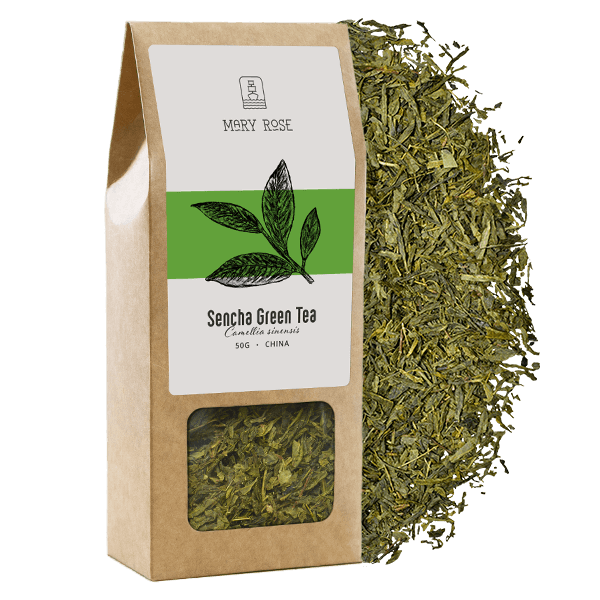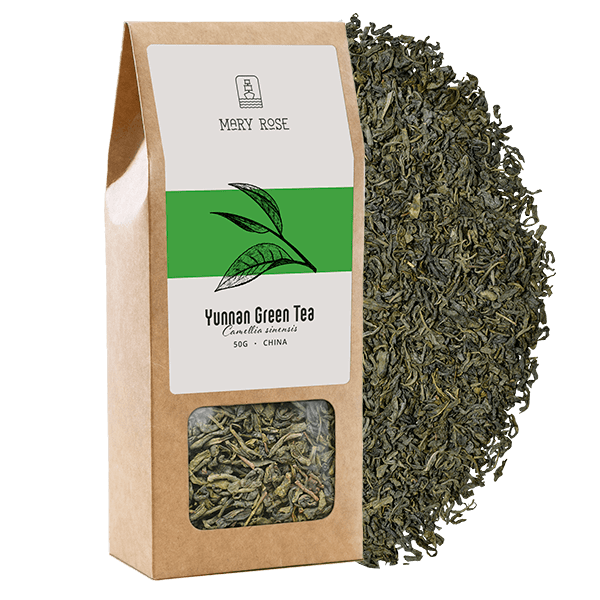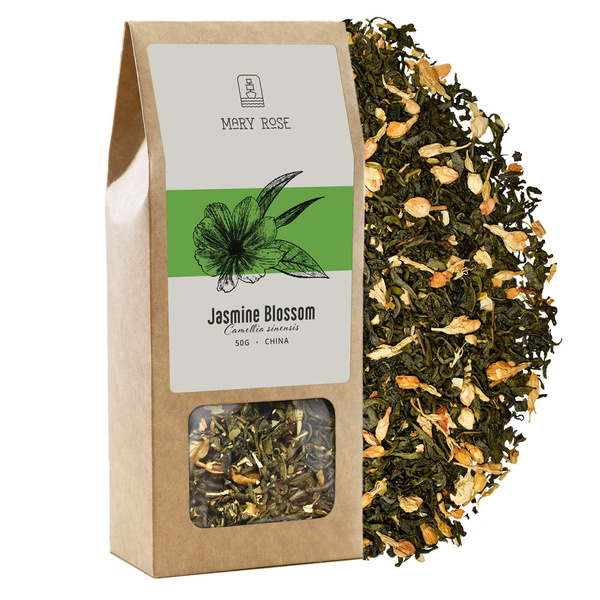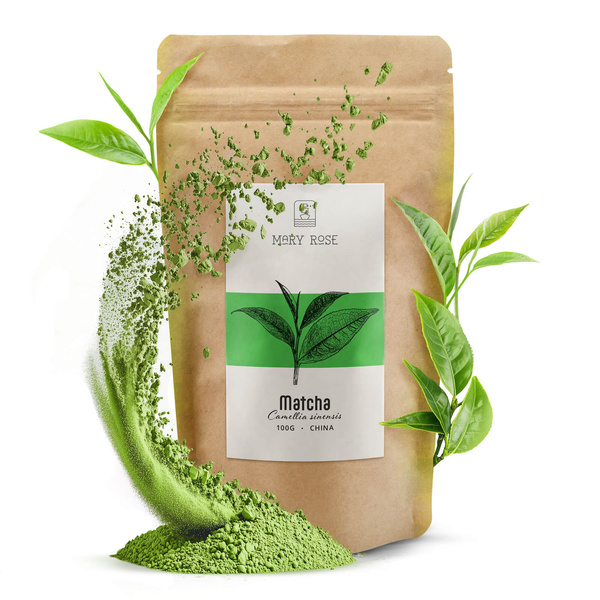Green tea – the elixir of health in a cup

Green tea has won the hearts and palates of people all over the world. Its numerous health properties, delicate taste and rich aroma make it an integral part of many people's daily diet. But what is really hidden in a cup full of green tea? Let's discover the secrets of green tea together!
Summary:
- Green tea – a drink full of history and tradition
- The power of nature – green tea and its properties
- Green tea – natural support for the body
- Green tea not for everyone? When is it worth being cautious?
- The art of brewing, or how to get the best out of green tea
Green tea – a drink full of history and tradition
A beverage that has endured for thousands of years and still delights with its taste and health benefits... Yes, we are talking about tea! The inconspicuous plant from which the essential brew is made began its journey in ancient China, where, according to legend, Emperor Shennong accidentally brewed the leaves of a wild tea plant in hot water. Who would have thought that an accident would spark a global revolution?
Today, green tea is one of the most widely consumed beverages in the world. Its popularity is not only due to its unique taste, but also to its numerous properties - about which you will read more later. In Europe and America, it is an everyday staple in many homes. In India, China or Korea, it plays an important role not only as an everyday drink, but also as part of traditional medicine. Green tea has won the hearts (and palates) of people on almost all continents, but centuries ago it was particularly loved by the people of Japan, where it has become an inseparable symbol of culture and tradition. Tea found its way to Japan around the 8th century, thanks to two monks, Kukai and Sencho, who had returned from an expedition to China, where they were travelling to learn about the philosophy of Buddhism. As a guest at the imperial court, they had the opportunity to taste a beverage that the entire Chinese aristocracy admired – and they themselves appreciated its qualities. This is how tea made its way to the Land of the Cherry Blossom, but – although it had already delighted many Japanese at the time – its actual popularisation did not take place until five centuries later, in the 12th century. This was thanks to another famous monk, Eisai. He established the first tea cultivation in Japan and was one of the first to describe the plant in detail. In his "Record of Drinking Tea for Nourishing Life", he defined the cultivation methods, processing methods and properties of tea. He also started the fashion in Japan for drinking green tea – the healthiest of all varieties. Over time, events began to be organised around the act of brewing and drinking tea, which slowly took on symbolic and spiritualistic significance. Finally, the famous Japanese cha-no-yu tea ceremony was born, which is still accompanied today by four main principles: harmony, respect, purity and tranquillity.
The power of nature – green tea and its properties
Camellia sinensis – this is the plant from which the tea infusion is made. There are many varieties: green, black, yellow, red... What are the differences? The secret lies in the production process, which affects the colour of the leaves and the resulting infusion, the taste and aroma, as well as the properties of each tea variety. While black tea, for example, undergoes full fermentation, green tea is only gently heated, which preserves more of the valuable nutrients. As a result, green tea has a more intense effect compared to other varieties. It contains more antioxidants and other bioactive compounds.
And what exactly is hidden in these inconspicuous leaves and the infusion they produce? Well, green tea is a real treasure trove of health! At the forefront are the catechins, a group of polyphenolic compounds. Among these, EGCG – epigallocatechin gallate – plays the most important role. What else can be found in green tea?
- L-theanine – an amino acid that helps you relax, improves cognitive function and emotional state,
- vitamins – B, C and E,
- minerals – including calcium, magnesium, chromium, manganese, iron, zinc, phosphorus and potassium,
- caffeine – a small amount that makes green tea mildly stimulating, but does so much more gently than coffee.
Green tea - what does it help with? First and foremost, it is a powerful antioxidant. Polyphenols, or the aforementioned catechins, are substances that help fight free radicals, protecting cells from damage and ageing. The antioxidant action of green tea is one of its most important assets, making it an ideal drink for health-conscious people. What about the heart? Green tea and blood pressure is a topic that deserves attention. Research suggests that drinking green tea regularly can help maintain normal blood pressure. This is very good news for our cardiovascular system! With its vitamins and minerals, green tea can also strengthen the immune system, helping the body to fight infections in a broad perspective.

Green tea – natural support for the body. What other effects does it have?
Green tea is a drink that not only tastes delicious, but also has many health benefits. Let's start with a question that many people ask themselves: does green tea stimulate? Yes, green tea does contain caffeine, which has a stimulating effect, but these are much smaller amounts than in coffee. As a result, a cup of green tea can be a great way to gently stimulate and improve concentration without the “caffeine slide” effect that often accompanies coffee. In addition, the L-theanine in tea, an amino acid that helps to reduce stress and improve mood, further moderates the effects of caffeine. Green tea can therefore be a good choice for early night or late evening relaxation – it will give a gentle boost, but will not cause insomnia.
What about weight loss? Does green tea slim down? Indeed, it is often recommended as a weight loss aid. The catechins and caffeine it contains can speed up metabolism and increase fat burning. Regularly drinking green tea can also help regulate blood sugar levels, which is important for those struggling with insulin resistance. Of course, green tea by itself will not make unwanted pounds disappear as if by magic, but it can be a valuable part of a balanced diet and healthy lifestyle.
Green tea not for everyone? When is it worth being cautious?
Green tea is a drink with many health benefits, but like any product, it has its own contraindications to be aware of. For whom might this drink prove less friendly?
- People who are hypersensitive to caffeine. If you feel like an earthquake after a cup of coffee, green tea is also worth being careful with. Although it contains much less caffeine than coffee and is definitely more mild in its effects, it can still cause unpleasant symptoms in people who are very sensitive to caffeine.
- Sleep issues. Although green tea is more relaxing than stimulating, and drinking it at night or late in the evening should not be a problem for most people, reaching for it just before bedtime should rather be avoided. People who have trouble falling asleep should be particularly cautious - even this small amount of caffeine can cause difficulty and reduce the quality of sleep.
- Stomach problems? Be careful! The tannins in green tea can irritate the gastric mucosa, which can lead to discomfort – especially if consumed on an empty stomach. People with sensitive digestive systems should consider other options, such as green tea with the addition of suitably selected herbs or replacing tea altogether with an herbal infusion.
- Pregnant and breastfeeding women. Green tea in pregnancy is a rather controversial topic. On the one hand, its properties can be beneficial for the mother-to-be. On the other hand, its caffeine content raises concerns. Small portions of green tea, drunk from time to time, are certainly not harmful during pregnancy, but moderation, observing one's own body and reacting if there are any problems is key.
The art of brewing, or how to get the best out of green tea
Brewing the perfect green tea is a real art that requires attention and precision – of course, we're talking about brewing good quality leaf tea and not the usual market tea in a bag. The temperature, the brewing time, the type of water and any tea additives are crucial. These details can determine whether your brew will be a divine treat or a bitter failure!
Green tea – how to brew to bring out the flavour and preserve the valuable properties?
Water temperature – the key to success! Green tea is delicate, so don't pour boiling water over it. There are many varieties of green tea, and each requires slightly different brewing conditions, but it can be assumed very roughly that the ideal water temperature should be between 65 and 80°C. How do you achieve this without a thermometer? Boil the water and wait for about 5 minutes. Voilà!
Brewing time – not too short, not too long. The golden mean is 1-3 minutes. Longer steeping will bring out more bitterness, and a shorter bath of tea in water may not release all the valuable ingredients. After a few minutes, it is a good idea to separate the leaves from the water – then you can brew them again.
Type of water – no joke! The type of water used to brew tea can have a dramatic effect on its taste. Green tea likes clean, soft water. If your tap water is hard, consider using filtered or spring water. You will feel the difference!
Additions – careful here! Good quality green tea tastes best solo, but if you like to experiment, you can try adding a little lemon, ginger, mint or chamomile flowers. Rather avoid sweetening green tea, especially with sugar – it will mask the subtle flavour and valuable properties. However, if you prefer to drink sweetened tea, opt for natural sweeteners such as honey, stevia or xylitol.
Why should you include drinking green tea in your daily routine? Because it's a simple way to look after your health and wellbeing. A tea break is the perfect time to relax in a busy day, a moment just for yourself. Imagine this: you wake up in the morning, stretch lazily and reach for a cup of freshly brewed green tea. Its delicate aroma rouses you to life and each sip is a shot of health for your body. Sounds tempting!
Source of information:
- Wikipedia: Green tea.
- V.R. Sinija, H.N. Mishra, Green tea: Health benefits, Journal of Nutritional & Environmental Medicine, 2008.
- C. Cabrera, R. Artacho, R. Giménez, Beneficial Effects of Green Tea – A Review, Journal of the American College of Nutrition, 2006.




